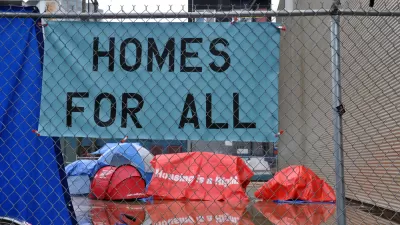With few enforcement mechanisms even in cities that have bans on source-of-income discrimination on the books, it’s up to nonprofit lawyers and tenants to sue landlords for retribution.

Housing and disability rights advocacy groups around the country are suing cities to spur enforcement of housing discrimination laws, which many have on the books but rarely enforce, writes Roshan Abraham for Next City. According to one estimate by Aaron Carr, founder and executive director of the national housing watchdog Housing Rights Initiative (HRI), roughly half of landlords and housing brokers tend to turn down Section 8 vouchers.
In Los Angeles, the Disability Rights Education and Defense Fund (DREDF) sued the city on behalf of one resident who was discriminated against based on his Section 8 vouchers, with positive results for himself and for other tenants. “The lawsuit reached settlements with two of the defendants in April, both owners of multi-family apartments in LA. The owners agreed to provide fair housing training for staff, state in advertisements that they accept Section 8, and report data on Section 8 applications and acceptance to DREDF. Defendants will also pay $35,000 to Gardner.”
For Gardner, the lawsuit was a last resort after government avenues failed to help him. The city’s law against source-of-income discrimination “doesn’t implement any fines or fees for landlords or lay out penalties; rather, it shifts enforcement to civil court, allowing tenants to recoup damages equal to three months rent or three times the ‘actual damages,’ whichever is higher”—putting the responsibility for enforcement, essentially, on the tenants.
FULL STORY: A Lawsuit That’s Forcing L.A. To Enforce Its Housing Voucher Discrimination Ban

Alabama: Trump Terminates Settlements for Black Communities Harmed By Raw Sewage
Trump deemed the landmark civil rights agreement “illegal DEI and environmental justice policy.”

Study: Maui’s Plan to Convert Vacation Rentals to Long-Term Housing Could Cause Nearly $1 Billion Economic Loss
The plan would reduce visitor accommodation by 25% resulting in 1,900 jobs lost.

Why Should We Subsidize Public Transportation?
Many public transit agencies face financial stress due to rising costs, declining fare revenue, and declining subsidies. Transit advocates must provide a strong business case for increasing public transit funding.

Paris Bike Boom Leads to Steep Drop in Air Pollution
The French city’s air quality has improved dramatically in the past 20 years, coinciding with a growth in cycling.

Why Housing Costs More to Build in California Than in Texas
Hard costs like labor and materials combined with ‘soft’ costs such as permitting make building in the San Francisco Bay Area almost three times as costly as in Texas cities.

San Diego County Sees a Rise in Urban Coyotes
San Diego County experiences a rise in urban coyotes, as sightings become prevalent throughout its urban neighbourhoods and surrounding areas.
Urban Design for Planners 1: Software Tools
This six-course series explores essential urban design concepts using open source software and equips planners with the tools they need to participate fully in the urban design process.
Planning for Universal Design
Learn the tools for implementing Universal Design in planning regulations.
Smith Gee Studio
Alamo Area Metropolitan Planning Organization
City of Santa Clarita
Institute for Housing and Urban Development Studies (IHS)
City of Grandview
Harvard GSD Executive Education
Toledo-Lucas County Plan Commissions
Salt Lake City
NYU Wagner Graduate School of Public Service





























